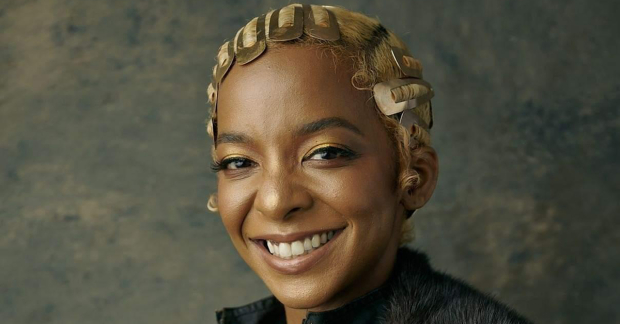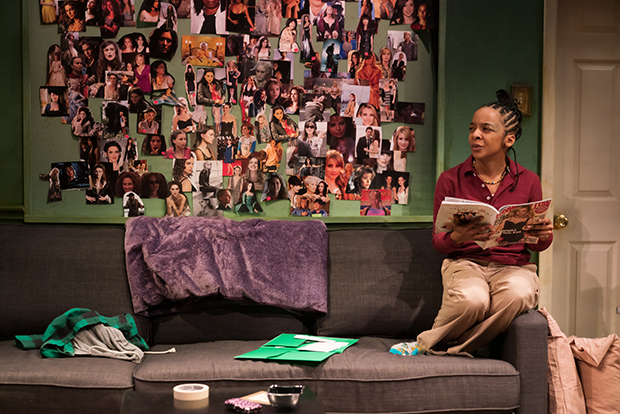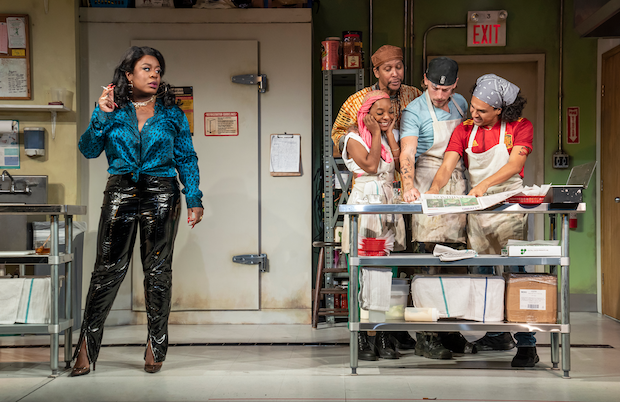More Than a Character: For Actor Kara Young, the Right Role Is Liberating
Following her Broadway debut, Young reflects on how theater has reshaped her understanding of self and society.

(© Elliot O'Donovan/handout image)
Fresh on the heels of her Broadway debut in two-time Pulitzer prize-winning playwright Lynn Nottage's Clyde's, actor Kara Young is now at work on Amazon Prime Video's dark comedy series I'm a Virgo, created, written, directed, and executive-produced by Boots Riley, the writer and director of Sorry to Bother You.
But Young still reflects on many of the characters she played onstage. These characters, she says, are helping her cleanse her mind and heal after the lack of representation of Black women on TV distorted her self-image as a girl, a reality backed up by studies that have made connections between television exposure and a decrease in self-esteem in children.
"Growing up with a television fucked me up," Young says. "It stifled a lot of imagination. Although I dreamed, I dreamed a lot in whiteness."
A first-generation American, Young was born in Harlem and raised by Belizean parents who worked in the healthcare and hospitality industries. She formed a bond with performing arts at 5 years old while taking an after-school mime class, following the footsteps of her older brother. By that time, mass media images were already tightening its grip on her impressionable mind.
As an adult, Young found it challenging to find roles that she connected to. However, she recalls an in-class assignment from her freshman year at Gettysburg College that made giving up not an option: she and a classmate, another Black woman, improvised a scene in which a daughter confronts her drug-addicted mother after realizing they didn't have money to pay for essential needs. Young, who played the mother, says the scene got emotionally intense.
"When we finished the scene, we looked up and everyone was bawling," she remembers. "It was a moment for me where I was like, ‘Oh wow, this is what I'm going to do for the rest of my life."

(© Daniel J. Vasquez)
The Cleanse and Healing
Even though that improv affirmed her aspiration, Young missed the cultural melting pot that is New York City, feeling misplaced in Gettysburg, Pennsylvania; today, the historic town known for the Civil War's battle that prompted President Abraham Lincoln's Gettysburg Address has a population that is 87 percent white and only 3 percent Black. Young experienced microaggressions. At a diner, she reached a tipping point during a negative encounter with a waitress who rudely plopped her breakfast plate on the table in front of her.
After one semester, she returned home, spent a year at the City College of New York and then finished at the New York Conservatory for Dramatic Arts. Young says it was the best experience, but she insists the best education has been her experience in the theater.
Young embarked on the journey to detox herself from the media images that shaped her as a little girl. She didn't know it at the time, but that journey called for her to become a kid again – this time onstage.
In 2016, she landed the role of Lea in Patricia Ione Lloyd's Pretty Hunger. Lea, a 7-year-old biracial girl who idolizes famed actor Bette Davis and is being raised by her white mother. Two years later, in Jonathan Payne's The Revolving Cycles Truly and Steadily Roll'd, Young played 17-year-old Karma, the only person who searches for her missing foster brother while navigating systemic oppression in what Payne describes as "an island isolated by poverty."
From there it was Jeff Augustin's The New Englanders, where she played "Eisa," a 17-year-old biracial girl who wrestles with being the only Black student in her high school. Before the pandemic forced an early closing of C.A. Johnson's All the Natalie Portmans, Young stepped in to the shoes of 16-year-old "Keyonna," who is on the brink of poverty and summons the Hollywood actor as her imaginary best friend.
Each of those characters were created by Black playwrights, whose works proved to be therapeutic and introspective for Young. Eisa, for example, echoes Young's experience in Gettysburg; Lea and Keyonna, and their fascination with white actresses draws parallels to Young's childhood
"[Those roles] allowed me to go inside myself and understand the younger part of me and how what I was consuming – via television and media – was not good for my spirit," she says. "The work cleanse, teaches and liberates me."

(© Joan Marcus)
The Reeducation and Broadway Debut
Young says playing Lea, Karma, Eisa, and Keyonna has taught her about Black humanity and the socioeconomic injustices that are the face of American trauma more than any textbook could.
That education continued when she made her Broadway debut late last year. She played Letitia in Lynn Nottage's Clyde's. Letitia, a short-order cook at a truck stop sandwich shop, is a formerly incarcerated mother who served time for stealing seizure medication for her daughter. She, along with her formerly incarcerated co-workers, puts pressure on herself to make the perfect sandwich.
"All Letitia is trying to do is not fail, but yet everything is failing her," Young says, noting that Letitia's incarceration exposes America's broken healthcare system and systemic racism. "I still think about her journey to work each day; think about these gas prices going up, and people can't even get to work to feed their kids."
Young says she constantly has revelations about the plays she's had the honor to be a part of. She credits the playwrights and their stories for shaping how she sees the world and says they have inspired her to embark on her on journey to start writing. She is now working on a short film about "two people who have nothing, but yet have everything, together."
"Black storytellers are pivotal to shifting consciousness for humanity," Young says. "Being a storyteller has been a spiritual education and a journey for my liberation."








